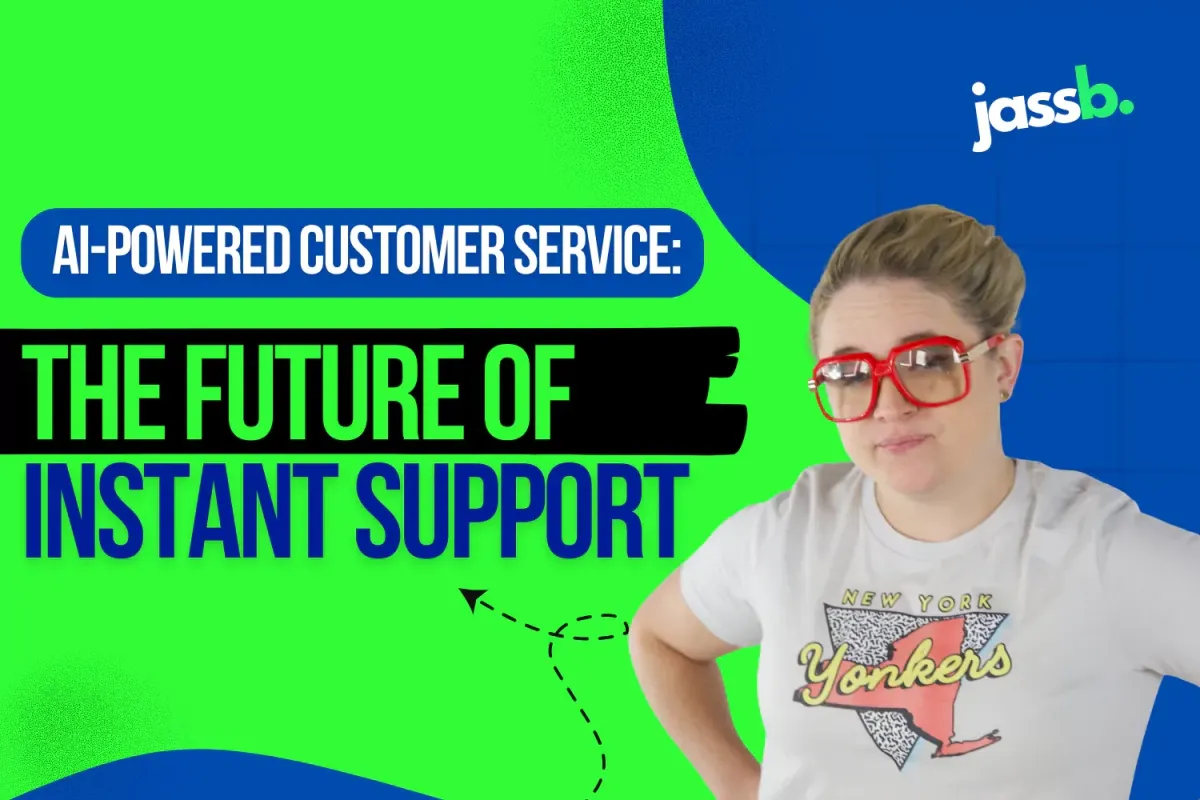
AI-Powered Customer Service: The Future of Instant Support
AI-Powered Customer Service: The Future of Instant Support
In today’s fast-paced world, customers demand quick, efficient, and personalized service. Traditional customer support channels, such as phone calls or emails, often struggle to meet these high expectations. This is where AI-powered customer service steps in, revolutionizing the way businesses interact with their customers.
With the rise of chatbots and AI assistants like ChatGPT, businesses can now provide 24/7 support, deliver personalized experiences, and improve overall customer satisfaction. In this blog, we'll dive into how AI is transforming customer service, its benefits, challenges, and what the future holds for this technology.
What is AI-Powered Customer Service?
AI-powered customer service involves using artificial intelligence technologies to assist customers, automate tasks, and enhance the overall customer experience. This can include anything from answering frequently asked questions (FAQs) to troubleshooting technical issues or even completing transactions.
At the heart of AI-powered customer service are chatbots and virtual assistants. These tools use machine learning (ML) and natural language processing (NLP) to understand and respond to customer queries in real-time. ChatGPT and similar AI models have made it easier for businesses to offer highly effective, automated support without sacrificing the quality of interaction.
How AI-Powered Customer Service Works
AI-powered systems are designed to understand human language, engage in meaningful conversations, and perform tasks autonomously. Here's how they work:
Natural Language Processing (NLP):
NLP enables AI to understand, interpret, and generate human language. It allows chatbots and assistants to process and respond to queries in a way that feels natural and conversational.Machine Learning (ML):
Machine learning helps AI systems learn from previous interactions, improving their responses over time. The more data the AI is exposed to, the better it becomes at predicting and answering customer queries.Automation of Repetitive Tasks:
AI can handle routine tasks like resetting passwords, checking order statuses, or providing basic product information, allowing human agents to focus on more complex issues.Integration with CRM Systems:
AI assistants can be integrated with a company's customer relationship management (CRM) system to retrieve customer data in real-time, offering personalized experiences for every interaction.
Benefits of AI-Powered Customer Service
1. 24/7 Availability
AI-powered systems never need to sleep, making them available round-the-clock to assist customers across different time zones. This is especially beneficial for businesses with a global customer base or those that need to provide support outside of regular working hours.
2. Instant Response Times
Chatbots and AI assistants can provide immediate responses to customer queries, reducing wait times and improving overall satisfaction. In a world where customers expect quick results, this speed can set businesses apart.
3. Personalized Customer Experience
AI systems can analyze customer data and previous interactions to offer tailored responses. By understanding a customer’s history and preferences, AI assistants can make relevant product recommendations or offer personalized support.
4. Cost Efficiency
Automating routine customer service tasks with AI reduces the need for large human support teams, helping businesses save on operational costs. AI can efficiently handle high volumes of inquiries simultaneously, something that would be difficult for human agents to manage.
5. Consistency and Accuracy
AI systems provide consistent and accurate responses, eliminating human error and ensuring customers receive the same quality of service every time. This consistency builds trust with customers.
Challenges of AI-Powered Customer Service
While AI-powered customer service offers numerous benefits, it does come with a few challenges:
Lack of Human Touch:
Despite their advancements, AI systems still struggle with understanding emotions and providing the empathy that human agents offer. In situations where emotional intelligence is required, human interaction may still be necessary.Complexity in Handling Difficult Queries:
AI may struggle with complex issues or highly specialized queries that require a human expert's knowledge. It’s essential for businesses to provide easy escalation options to human agents when needed.Data Privacy and Security:
AI systems often require access to customer data to personalize services. Companies must ensure that these systems are secure and that customer information is protected from breaches or misuse.Training and Maintenance:
AI models need constant training and updates to stay relevant and effective. Businesses need to invest in the ongoing maintenance of their AI systems to ensure that they provide accurate and useful support.
The Future of AI-Powered Customer Service
The future of AI-powered customer service looks promising, with many exciting developments on the horizon:
Advanced Emotional Intelligence:
AI systems are expected to get better at recognizing and responding to customer emotions. Future AI-powered assistants may offer a more empathetic and human-like interaction, enhancing customer satisfaction.Voice Assistants and Conversational AI:
As voice recognition technology improves, we can expect AI assistants to handle voice-based interactions, making them even more versatile and accessible. Virtual assistants like Amazon's Alexa and Google Assistant are paving the way for voice-driven customer service.AI Integration with Omnichannel Support:
AI systems will become more integrated with multiple communication channels, allowing businesses to provide seamless support across live chat, email, social media, and even in-store experiences.Self-Service and Predictive Support:
AI will increasingly empower customers to solve problems on their own through self-service portals. Predictive AI will also anticipate customer needs before they arise, offering proactive support.
Conclusion
AI-powered customer service is revolutionizing the way businesses engage with their customers. By automating routine tasks, providing instant responses, and offering personalized support, AI is helping companies deliver exceptional customer experiences at scale. While challenges remain, the future of AI in customer service is bright, with advancements that promise even more efficiency, empathy, and convenience for both businesses and customers.
